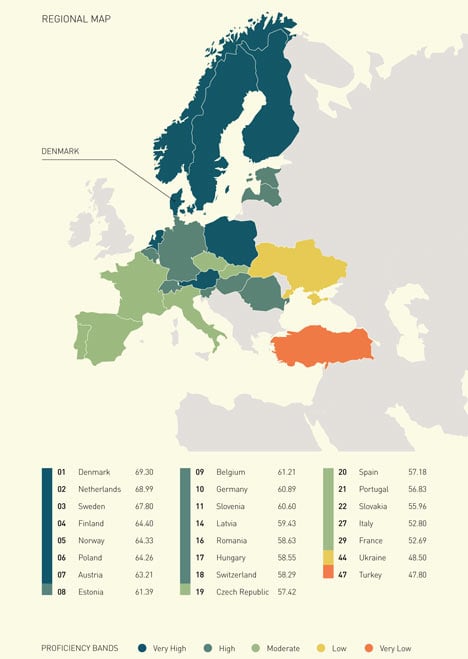EDUCATION
Danes world’s best non-native English speakers
Danes are the best in the world at speaking English as a second language, a major report released this week concluded.
Published: 12 November 2014 16:26 CET

Photo: Nicolai Perjesi/Copenhagen Media Center
The Education First (EF) English Proficiency Index (EPI) ranked Danes as the best non-native English speakers in the world.
Of the 63 non-Commonwealth countries included in the study, Denmark was one of just seven in the category of ‘very high proficiency’. Behind Denmark were the Netherlands, Sweden, Finland, Norway, Poland and Austria.
See also: Top 10 mistakes Danes make in English
Denmark’s proficiency score of 69.3 was enough to top the list and was significantly higher than the average EF EPI score of 56.92. Denmark’s proficiency score has risen by 2.72 points over the past seven years.
That figure could very well continue to climb. With a reform of Denmark's public school system that took effect this year, Danish students are now taught English beginning in the first grade.
“English is a very powerful platform for both commercial and cultural exchange. Language is a hugely important, but often overlooked, door opener. By mastering the English language at a world-class level, Danes have a clear advantage in the world. This is something to be proud of,” Christen Bagger, the head of EF in Denmark, said.
Click the map for larger version. Story continues below.
Denmark returned to the top spot of the index after being topped by Norway, the Netherlands and Estonia in last year’s list. In 2012, Denmark was in second place behind Sweden.
Globally, the report found that the world’s population is getting better at speaking English and that Europe’s English proficiency remains far higher than other regions’, and continues to improve.
“Worldwide, English proficiency among adults is rising, although this increase is far from uniform in all countries and all populations,” the EF EPI report reads.
The report, the fourth of its kind, also found a significant gender gap when it comes to English skills.
“Women speak better English than men worldwide and in nearly every country surveyed.This gender skill gap is significant enough to have an impact in the workplace,” the report reads.
This was also the case in Denmark, although the difference was not as pronounced as in most countries.
The study also concluded that there are strong correlations between English proficiency and income, quality of life, ease of doing business, Internet usage, and years of schooling. These correlations are remarkably stable over time, stated EF in its findings.
EF is the world's largest educational company, specializing in language learning, academic programs and cultural exchange. The company was founded in 1965 and today operates 500 schools and offices across 52 countries.
Url copied to clipboard!



 Please whitelist us to continue reading.
Please whitelist us to continue reading.
Member comments